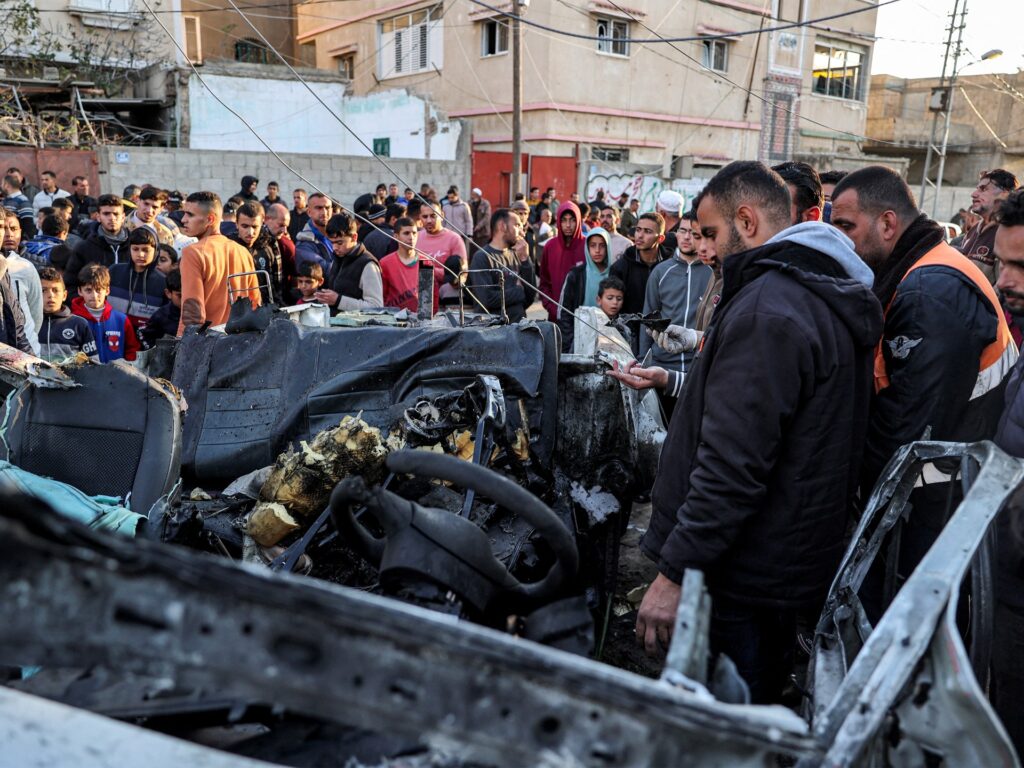Israeli forces bomb areas in the southern border city of Rafah, where more than half of the Gaza Strip's internally displaced people have taken refuge, as the US warned that a military invasion of the Strip could be a “catastrophe” .
Aid agencies have warned of a humanitarian catastrophe if Israel carries out its threat to invade Rafah. Rafah is one of the last areas of the Gaza Strip not occupied by troops, with people desperately seeking shelter.
“If we were to carry out an operation like this right now with little planning, it would be a disaster” in a region where 1 million people have been evacuated, State Department deputy spokesman Vedant Patel said Thursday.
He said Washington “has not yet seen any evidence that it is seriously planning such an operation.”
Earlier, UN Secretary-General António Guterres warned that more than 1 million civilians were trapped in the southern city of Gaza.
“Right now half of Gaza's population is crammed into Rafah. They have nowhere to go,” he said.
Palestinians in Gaza are fiercely resisting the border fence in southern Gaza, which is currently home to more than 1 million people, many of them living in makeshift tents, to thwart the threat of an Israeli attack on Rafah. , is anxious for a ceasefire to be reached in time.
Israeli warplanes bombed parts of the city on Thursday morning, hitting two homes and killing at least 14 people, residents said. Tanks also shelled some areas east of Rafah, raising fears among residents of an impending ground attack.
diplomatic efforts
The warning came as diplomats tried to salvage ceasefire talks after Prime Minister Benjamin Netanyahu rejected a Hamas proposal.
In a sign that diplomacy is not yet over, a Hamas delegation led by senior official Khalil al-Haya arrived in Cairo on Thursday to negotiate a ceasefire with key mediators Egypt and Qatar.
Prime Minister Benjamin Netanyahu on Wednesday called the ceasefire terms proposed by Hamas a “delusion”, said victory was within months and vowed to keep fighting.
Further talks are planned despite Israel's rejection of Hamas's proposal. Secretary of State Antony Blinken met with mediators this week on his fifth visit to the region since the war began, and said there was still room for negotiations.
Blinken also said the civilian death toll was too high and reiterated that Israeli operations must put civilians first.
“That is especially true in Rafah, where between 1.2 and 1.4 million people live, many of whom have fled from other parts of Gaza,” he said.
He said he had consulted with Israeli leaders and suggested several ways to minimize damage, but he did not elaborate. Blinken departed to return to the United States on Thursday afternoon.
Egypt's Hamas delegation is scheduled to meet with Egyptian intelligence chief Abbas Kamel and other officials, Egyptian security sources said.
Hamas proposed a four-and-a-half month ceasefire during which all hostages would be released, Israel would withdraw its troops, and an agreement would be reached to halt Israeli attacks. The proposal was a response to a proposal drawn up by the U.S. and Israeli spy chiefs, along with Qatar and Egypt, and submitted to Hamas last week.
Hamas has said it will not agree to any deal that does not include a cessation of attacks and an Israeli withdrawal. Israel says it will not withdraw or stop fighting until Hamas is eradicated.
Israel launched a major military offensive after Hamas fighters killed 1,139 people and took 253 hostages in southern Israel on October 7, according to an Israeli tally.
The Israeli military said on Thursday that its forces had killed more than 20 fighters in the past day in Khan Yunis, the main city in the southern Gaza Strip, where the heaviest fighting is currently taking place in the war.
The Gaza Health Ministry says at least 27,840 Palestinians have been confirmed killed and more than 67,000 injured since the start of the war.
Israeli shelling continued in Khan Yunis and Deir El Bala in central Gaza, killing Palestinian television journalist Nafez Abdel-Jawad and his son.
The Gaza Ministry of Information has announced that at least 124 journalists and media representatives have been killed in the enclave so far.
Philippe Lazzarini, head of UNRWA, the United Nations' main agency helping Palestinians, told the X show that his agency was not allowed to bring food to areas where people were on the verge of starvation.

